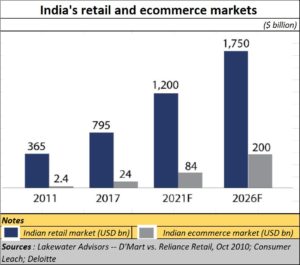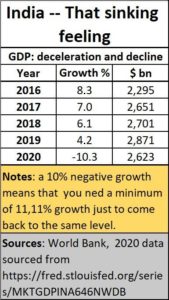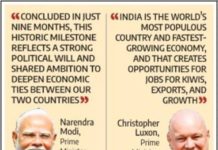https://www.freepressjournal.in/analysis/when-union-minister-piyush-goyal-got-it-wrong-about-retail-trade-and-ecommerce
Five things that Minister Piyush Goyal was totally wrong about.
By RN Bhaskar
August 2021 was a dark day for India. Piyush Goyal, the Union Minister for Commerce (whom the government has also made minister for textiles and consumer affairs, food, and public distribution) delivered a tirade against the captains of Indian industry for a full 19 minutes at a CII meeting. Worse still, he then asked the CII to block public access to the video-streamed and recorded proceedings. Did nobody tell him that sunlight is the best disinfectant? If the minister was right, why block the video footage?
Luckily, The Hindu faithfully kept a recording of the minister’s fulminations, and then wrote about it. Any reader will find the contents shocking, if not repugnant (https://www.thehindu.com/business/Industry/industrys-practices-are-against-national-interest-says-piyush-goyal/article35902835.ece).
 His ire appears to be against the way the Tatas want to push their ecommerce business. His remarks against Amazon and Flipkart also lend credence to this interpretation. Such views were buttressed by the defence put up by one body — the Confederation of All India Traders (https://economictimes.indiatimes.com/news/economy/policy/piyush-goyal-faces-heat-for-criticism-of-businesses-including-tata/articleshow/85325386.cms?from=mdr).
His ire appears to be against the way the Tatas want to push their ecommerce business. His remarks against Amazon and Flipkart also lend credence to this interpretation. Such views were buttressed by the defence put up by one body — the Confederation of All India Traders (https://economictimes.indiatimes.com/news/economy/policy/piyush-goyal-faces-heat-for-criticism-of-businesses-including-tata/articleshow/85325386.cms?from=mdr).
In fact, there are five reasons why Piyush Goyal’s tirade was bad in content, and worse in delivery.
- This was the second time that a minister had dared to become imperious with heads of organisations. The first time was when finger-wagging finance minister, Nirmala Sitharaman, imperiously warned heads of banks of dire consequences if they did not link PAN Numbers to Aadhaar cards (https://asiaconverge.com/2020/11/pushinng-the-banking-sector-towards-money-laundering/). The second time, it was Goyal. Were they trying to show to the country that they were lords and masters of all they could survey? Such imperiousness is unacceptable in a democracy, which believes in a rules-based system.
- All growth is in national interest. The retail trade has continued to grow despite the entry of Walmarts, Flipkarts and Amazons in India. The entry of the Tatas in this space will only help the market grow bigger. See the chart alongside. While the ecommerce market has grown, India’s larger retail market has also grown. In fact, every market in the country grows, thanks to the enterprise of its people. They shrivel when the government tries to poke its nose into how businesses should be run. Remember, how the textile industry almost collapsed. Then the government abolished the quota system in 2005, and the industry has been growing ever since. Ditto with the telecom sector, which was extremely profitable, till the government stepped in with strange laws thus changing the rules of the game. Ditto with gold mining (https://asiaconverge.com/2021/01/gold-mining-series/). Ditto with the dairy industry, which is today the world’s largest. Dr. Verghese Kurien, the Milkman of India, ensured that it grew without government support or subsidies. Today, it is three times larger in value than rice and wheat combined. Yet, with the government trying to play games in this sector by selectively giving out subsidies to some players, expect a shrivelling up of growth for this industry as well.
- Anti-national is a word that should be used very sparingly. Was the ministry trying to revive McCarthyism in India? Unfortunately, after Indira Gandhi’s fulminations, this government has also used this term repeatedly, and needlessly — against JNU protestors, against Jamia Milia students, against the Tablighis. Almost all charges were thrown out by the courts. So, is it the industry’s turn now? The only time when national interests were actually sought to be hurt was when the government almost sabotaged the dairy industry a couple of years ago by tacitly allowing New Zealand to export its dairy products into India (https://asiaconverge.com/2019/08/indian-bureaucrats-almost-shortsold-the-milk-industry-at-fta-cpec-negotiations/). That would have crippled the dairy sector. Fortunately, the 10 crore households (50 crore people, or over one-third of the population) who live by dairy farming let out a howl of protest. The government backtracked. So, was that ever called anti-national??
- Ministers must maintain decorum and dignity with responsible officers and industrialists. The finance minister broke this cardinal rule with banks. Piyush Goyal broke this with India’s industrialists. Just observe the imperiousness with which the minister said that he had conveyed his views about national interests to “Chandra”. Was he referring to an office boy? Ministers should not refer to the captains of industry this way.
- Finally, remember that these industry leaders are the people who are both wealth generators and job creators. The government creates jobs, yes. But it does this at the expense of taxpayers. Industrialists actually create jobs and also generate wealth. The ministerial perquisites that legislators enjoy is because of the money of taxpayers. Many of them make this money from opportunities created by industrialists. The real value destroyers are the scamsters – you have never heard the minister scolding the Bhushans or the Ruias or the Sandesarias. So why pick on industrialists who generate wealth?
In fact, the minister needs to be educated on what the retail trade and ecommerce have already contributed to this country. And this is with the help of the Walmarts, Amazons and Flipkarts.
It today accounts for over 10% of the country’s gross domestic product (GDP) and around 8% of employment, points out IBEF (https://www.ibef.org/industry/retail-india.aspx)
According to Forrester Research, in 2020, India’s retail sector was estimated at US$ 883 billion, with grocery retail accounting for US$ 608 billion. The market is projected to reach ~US$ 1.3 trillion by 2024.
Revenues of India’s offline retailers, also known as brick and mortar (B&M) retailers, are expected to increase by Rs. 10,000-12,000 crore (US$ 1.39-2.77 billion) in FY20.
The Indian retail trading has received Foreign Direct Investment (FDI) equity inflow totalling US$ 3.44 billion during April 2000-December 2020, according to Department for Promotion of Industry and Internal Trade (DPIIT).
 In other words, the retail industry is doing well. Don’t do anything foolish to make it shrink and lose jobs. It will add additional burden to an already shrinking economy.
In other words, the retail industry is doing well. Don’t do anything foolish to make it shrink and lose jobs. It will add additional burden to an already shrinking economy.
Do note, dear minister, that much of the economic slowdown was on account of government policies, and not because of the lack of efforts by industry. Imperiousness does not work here. Nor do commands. Nation building is discussing things. Pleasantly. And constructively.
The minister’s remarks were unfortunate. Even irresponsible. This should not happen again.










































COMMENTS